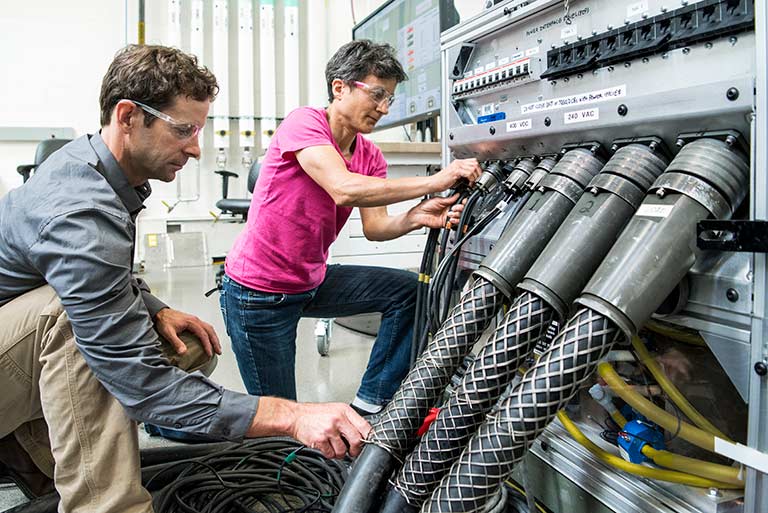Explore our collection of new stories for this topic.
Search or filter for a specific story using the options below.
September 2017
NREL, EasyMile Collaboration to Usher in New Wave of Autonomous Vehicle R&D
In an important step toward furthering intelligent, efficient, and autonomous electric vehicles, NREL plans to partner on research and development efforts with EasyMile, a French smart mobility solutions company with offices in Denver, Colorado, and Singapore.
News Release: NREL Investigates Coatings Needed for Concentrating Solar Power
Keeping storage tank corrosion rates to a minimum considered vital for use of molten salts
News Release: Enzyme's Worth to Biofuels Shown in Latest NREL Research
An enzyme discovered at the U.S. Department of Energy’s (DOE) National Renewable Energy Laboratory (NREL) proves adept at breaking down cellulose fibers regardless of whether their crystalline structure is simple or highly complex. No other enzyme has shown that ability.
Wind and Wave Energy Pioneer Finds Freedom in Research
Research Fellow Bob Thresher likes to venture into the unknown, a quality that spurred his pioneering career at NREL.
News Release: NREL Report Shows Utility-Scale Solar PV System Cost Fell Nearly 30% Last Year
The installed cost of solar power fell to record lows in the first quarter of 2017 because of the continuing decline in photovoltaic (PV) module and inverter prices, higher module efficiency, and lower labor costs, according to an analysis by the U.S. Department of Energy's (DOE) National Renewable Energy Laboratory (NREL).
A New Theory on Crystal Symmetry May Lead to Advanced Applications
Angelo Mascarenhas and Brian Fluegel, scientists at the Energy Department’s National Renewable Energy Laboratory (NREL), have published a theory for crystal lattices with a tensor periodicity that may inspire a new generation of techniques for growing materials with properties that can be exploited for electronic, photonic, and optical energy-storage applications.
Colorado State Patrol Vehicles to Utilize NREL Parking Garage
The Colorado State Patrol (CSP) began parking vehicles on the fifth floor of the NREL Parking Garage under an agreement with the U.S. Department of Energy.
August 2017
NREL-Developed CUBE Helps Solve Army's Refueling Challenge
Device takes in power from PV panels, diesel generators, battery and puts all to use
International Experts to Share Technical Progress and Solutions at 2017 International PV Soiling Workshop
The workshop will be October 23-25, 2017, at the Dubai World Trade Center. Three days of technical presentations will cover topics such as soiling losses in harsh climates, modeling and predicting soiling losses, procedures and equipment for measuring soiling losses, robotic cleaning machines, antisoiling coatings, and International Electrotechnical Commission standards in connection to photovoltaic soiling.
News Release: NREL, Swiss Scientists Power Past Solar Efficiency Records
Collaboration between researchers at the U.S. Department of Energy's National Renewable Energy Laboratory (NREL), the Swiss Center for Electronics and Microtechnology (CSEM), and the École Polytechnique Fédérale de Lausanne (EPFL) shows the high potential of silicon-based multijunction solar cells.
Share
Last Updated May 5, 2025



